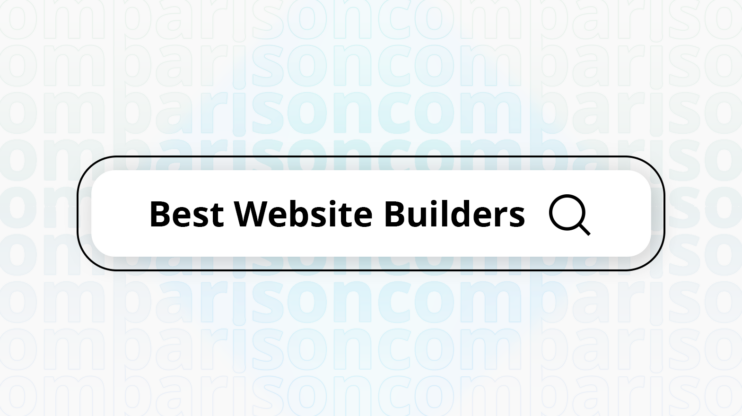Final verdict
Squarespace and WordPress cater to different user needs, making the choice between them dependent on your specific requirements.
-
Squarespace (Overall Grade: 7.9/10)
excels in user-friendliness, design quality, and integrated features, making it an excellent choice for users seeking a straightforward, all-in-one solution for building professional websites without extensive technical knowledge. Its robust customer support, comprehensive security measures, and built-in marketing tools further enhance its appeal to small businesses, creatives, and individuals looking for a hassle-free web presence. -
WordPress (Overall Grade: 7.1/10)
, with its open-source flexibility, extensive customization through themes and plugins, and strong community support, stands out for users requiring a high degree of control over their website’s design and functionality. It’s particularly suited for those with some technical expertise or those willing to invest time in learning, offering unparalleled possibilities for blogs, complex websites, and online stores through plugins like WooCommerce.

Build your website in 1 minute
Loved the designs? Your website is just a few clicks away. Start
with 10Web AI Website Builder to effortlessly bring your vision to life.

|

|
|
|---|---|---|
|
Design functionalities & templates |
8.0 |
9.0 |
|
Ease of use |
8.3 |
7.2 |
|
Ecommerce |
8.2 |
8.4 |
|
Website Editors |
8.3 |
8.5 |
|
Product testing options |
7.4 |
8.1 |
|
Price |
8.4 |
5.9 |
|
Hosting quality |
7.6 |
N/A |
|
Website speed optimization |
6.7 |
6.5 |
|
Plugins and integrations |
6.8 |
8.8 |
|
Marketing features |
8.1 |
8.0 |
|
Customer support |
7.8 |
5.0 |
|
Security |
8.8 |
6.7 |
|
AI capabilities |
7.5 |
6.1 |
|
User Management |
7.4 |
8.8 |
| Overall |
7.9 |
7.1 |
Best for ecommerce
 8.2
8.2
 8.4
8.4
Verdict
: WordPress edges out with a slight lead in ecommerce flexibility and customization, making it better suited for users seeking extensive ecommerce features and scalability.

Say goodbye to website errors
Achieve peace of mind with 99.99% uptime on 10Web Managed
WordPress Hosting, powered by Google Cloud. Your site remains fast,
secure, and resilient, ready for anything.
-
Squarespace
: Offers a streamlined ecommerce experience with an intuitive interface and built-in marketing tools, making it ideal for users looking for simplicity and ease of use. -
WordPress
: With the WooCommerce plugin, WordPress becomes a powerful ecommerce platform, offering extensive customization options and a vast plugin ecosystem, catering to users with specific ecommerce needs and scalability in mind.
Best for informational & business websites
 8.4
8.4
 9.2
9.2
Verdict
: WordPress is the superior choice for users seeking extensive customization and control over their informational or business website, while Squarespace offers a more streamlined and secure experience for those prioritizing ease of use and support.
-
Squarespace
: Known for its simplicity and elegant design options, Squarespace is ideal for users who want to create professional-looking websites without delving into the complexities of web development. It provides robust security, reliable hosting, and excellent customer support, making it a solid choice for businesses that need a hassle-free online presence. -
WordPress
: With its unparalleled flexibility and vast array of design options, WordPress stands out for users who demand full control over their website’s appearance and functionality. It’s particularly suited for those who have specific design visions or require extensive plugins and integrations for their informational or business websites.
Detailed comparison
Design functionalities & templates
Design FunctionalitiesRepresents how well each platform allows for creative design and customization of websites.Score Components:
- Template Variety (30%): Range and quality of design templates.
- Customization (30%): Flexibility and options for design alterations.
- User Interface (20%): Ease and intuitiveness of the design process.
- Responsiveness (10%): Adaptability to different devices and screen sizes.
- Innovation (10%): Unique design features and tools.
 8.0
8.0
 9.0
9.0
🏆
Winner: WordPress.
If you’re looking for a platform that offers more creative control, a wide array of design features, and extensive customization options, WordPress is the preferred choice.
Squarespace boasts an impressive variety of website templates, offering over 120 pre-designed options to choose from. These templates cater to a wide range of needs and industries, from creative portfolios and sleek online stores to professional business websites and personal blogs.


Compared to Squarespace, WordPress offers an extensive variety of templates and designs, catering to a wide range of website types beyond just blogs or ecommerce. Its open-source nature allows for high customization and creative freedom, appealing to diverse user needs. While WordPress itself doesn’t sell premium templates, numerous third-party theme shops offer sophisticated and specialized design choices, expanding the possibilities for users.
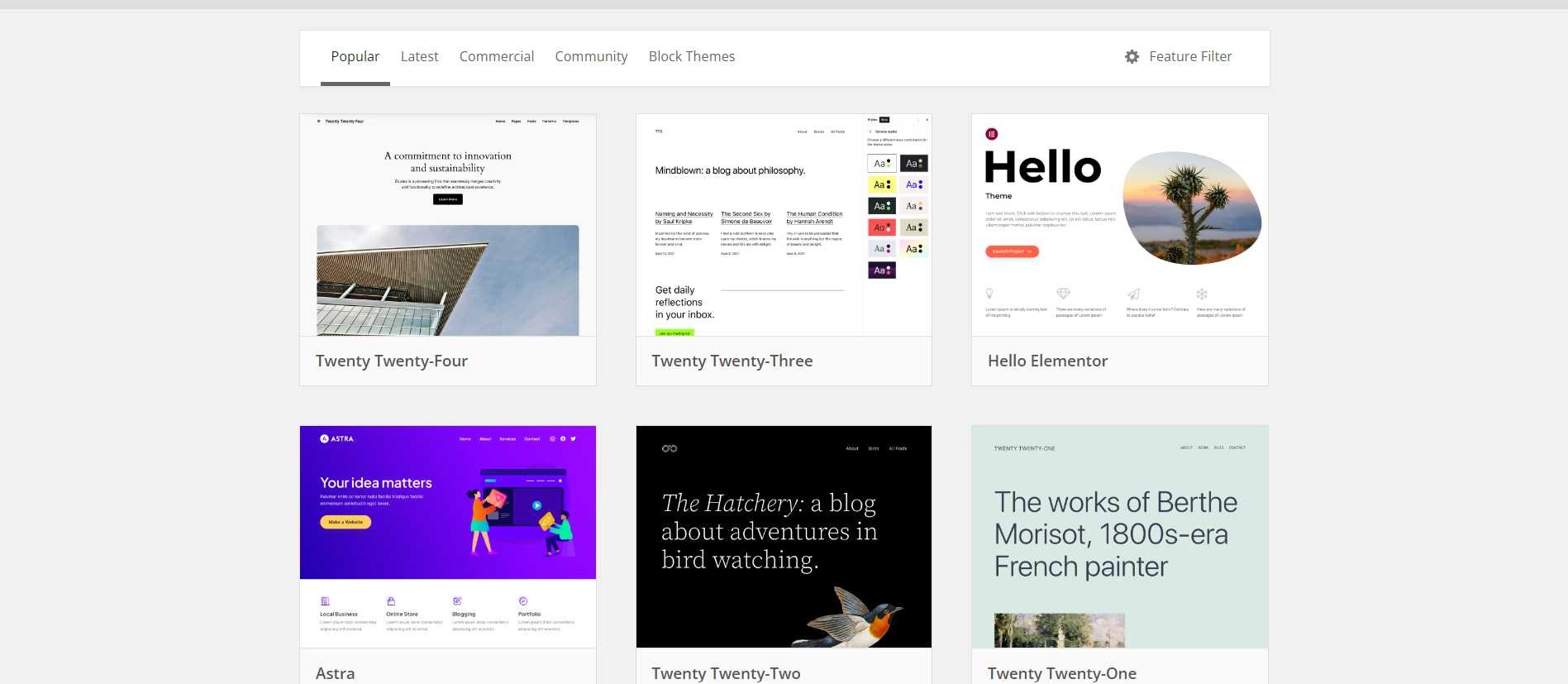

Get a head start on website creation with AI
Create a custom website tailored to your business needs 10X faster with 10Web AI Website Builder!
Ease of use
Ease of useReflects the platform’s overall user-friendliness.Score
Components:
- Learning curve (40%): Quickness and ease of getting started.
- Interface design (30%): Simplicity and intuitiveness of layout.
- User guidance (20%): Quality of tutorials and support.
- Flexibility (10%): Adaptability to various user skills.
 8.3
8.3
 7.2
7.2
🏆 Winner: Squarespace
. With a score of 8.3, Squarespace is known for its user-friendly interface and straightforward navigation, making it an excellent choice for those seeking a hassle-free website creation experience. WordPress, scoring 7.2, offers great flexibility and power but can be less intuitive for beginners. If ease of use is a priority, Squarespace is the clear winner in this category.
Learning Resources
🏆 Winner: Tie
. Both Squarespace and WordPress offer extensive learning resources, making it easier for users to learn and adapt. Squarespace provides a comprehensive Help Center, clear video tutorials, live webinars, an informative blog, and an active community forum. WordPress, on the other hand, is supported by a vast array of learning resources, including detailed documentation, community forums, online tutorials, and courses.
For ecommerce
EcommerceMeasures the platform’s effectiveness in supporting online business activities.Score Components:
- Ecommerce themes and templates (20%): Variety and design of templates.
- Product management (25%): Ease of managing and organizing products.
- Payment options (25%): Variety and convenience of payment methods.
- Ecommerce features (20%): Features for managing an ecommerce store.
- Integration (10%): Compatibility with external e-commerce tools and services.
 8.2
8.2
 8.4
8.4
When it comes to ecommerce, both Squarespace and WordPress have their strengths. Squarespace offers a user-friendly ecommerce solution with an intuitive interface and customizable templates. It handles secure payment processing, flexible shipping options, and automated tax calculations. On the other hand, WordPress, with the help of plugins like WooCommerce, provides a robust ecommerce solution with extensive customization options.

|

|
|
|---|---|---|
|
Ecommerce themes and templates |
7.5 |
9.2 |
|
Product page customization |
7.0 |
9.0 |
|
Payment processing and commissions |
7.8 |
7.5 |
|
POS capabilities |
6.5 |
6.5 |
|
Payment gateways |
7.5 |
8.5 |
|
Product numbers |
6.8 |
7.0 |
|
Additional ecommerce features |
7.2 |
8.0 |
Squarespace ecommerce features:
- Intuitive interface
- Secure payment processing
- Built-in marketing tools
- SEO optimization
- Website analytics
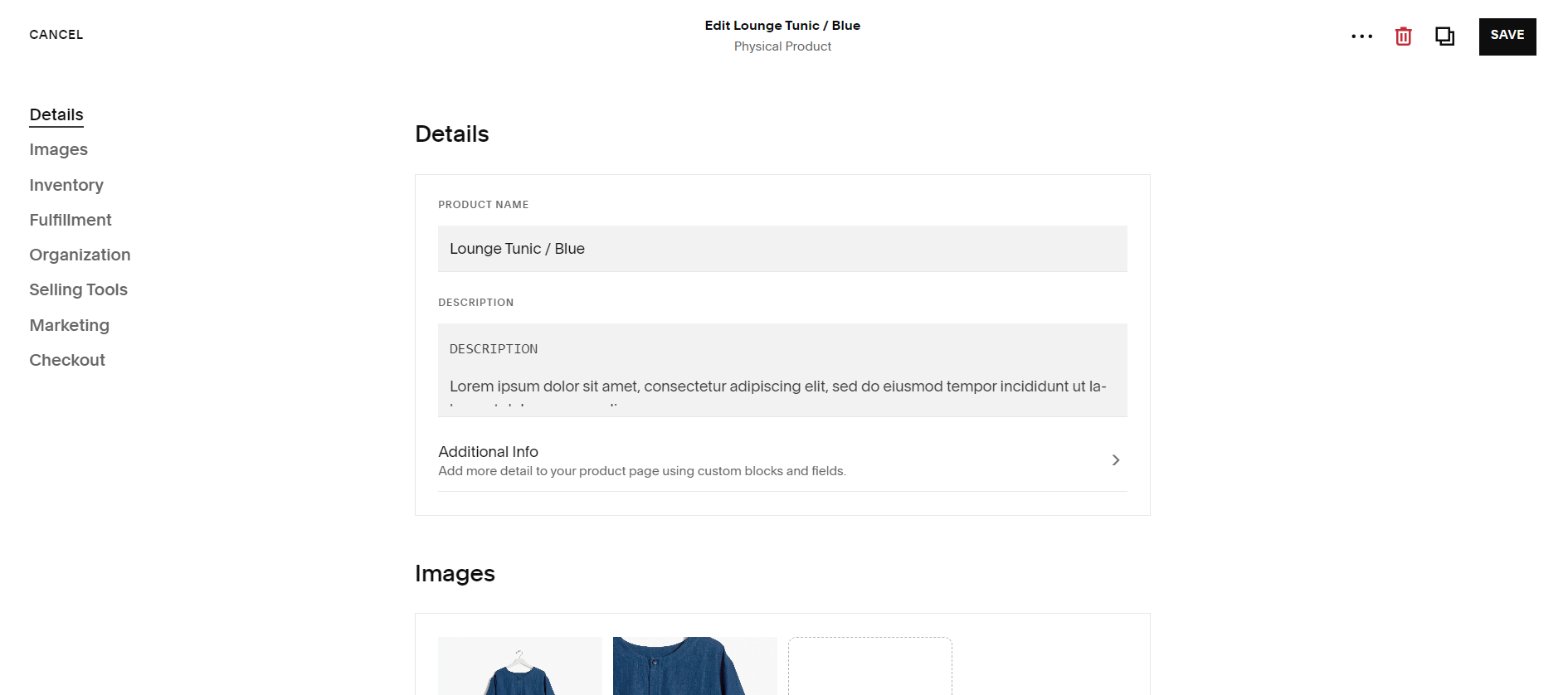
WordPress ecommerce features:
- WooCommerce Integration
- Multiple Payment Gateway Support
- Abandoned Cart Recovery
- Ecommerce Analytics
- SEO Optimization Tools
- Extensive Plugin Ecosystem
Ecommerce themes & templates
Squarespace provides a diverse selection of around 50 ecommerce templates, catering to various industries like fashion, beauty, home goods, and technology. These templates range from clean and minimalist to bold and colorful, accommodating different brand aesthetics and product types. Offering unique layout elements such as product sliders and featured collections, these templates enhance visual interest and engagement.
On the other hand, WordPress offers hundreds to potentially thousands of ecommerce and WooCommerce specific themes and templates, both free and premium, with the number constantly changing due to new themes and updates.
Product page customization
When it comes to product page customization, Squarespace offers options for layout, design, and interactive elements. However, it has limitations like fixed core page structure and the need for technical expertise. Free templates have fewer customization options than premium ones. WordPress, with WooCommerce, offers extensive customization for eCommerce product pages, balancing plugins, page builders, and custom coding. Tools like Elementor and the Ultimate Product Catalog plugin enhance functionality, but heavy plugin use may affect site performance.
Get a head start on website creation with AI
Create a custom website tailored to your business needs 10X faster with 10Web AI Website Builder!
Payment processing
Squarespace provides flexible payment processing for online stores with integrated gateways like Stripe and PayPal. External gateways can be set up for specific needs. Transaction fees may apply depending on the plan and payment method. Security measures include PCI compliance and fraud prevention. Additional features include payment links, support for subscriptions, and the ability to accept international payments in various currencies.
WordPress doesn’t handle payments directly but offers plugin options for payment processing. Popular gateways include PayPal, Stripe, Authorize.Net, and Square. Choose a gateway based on transaction volume, currencies, fees, and security. Plugins integrate gateways with WooCommerce for a user-friendly setup. Consider options for recurring payments, offline payments, and fraud prevention. Research, read reviews, and start small, scaling as needed.
Website Editors
Website EditorsEvaluates the platforms’ website building and editing capabilities.Score Components:
- Customization tools (40%): Range and power of editing features.
- Editor usability (30%): User experience within the editor.
- Design flexibility (20%): Freedom in layout and design changes.
- Update and maintenance ease (10%): Simplicity of updating and maintaining the site.
 8.3
8.3
 8.5
8.5
🏆
Winner: WordPress
. WordPress, with a score of 8.5, offers a user-friendly interface with block-based editing, extensive styles customization, template management, page editing/creation, distraction-free modes, versatile saving options, and accessibility for users of all skill levels. It provides a WYSIWYG (What You See Is What You Get) interface, and changes can be applied globally, including Header and Footer templates. The editor also offers features like undo/redo, List View, Command Palette, and customization tools.
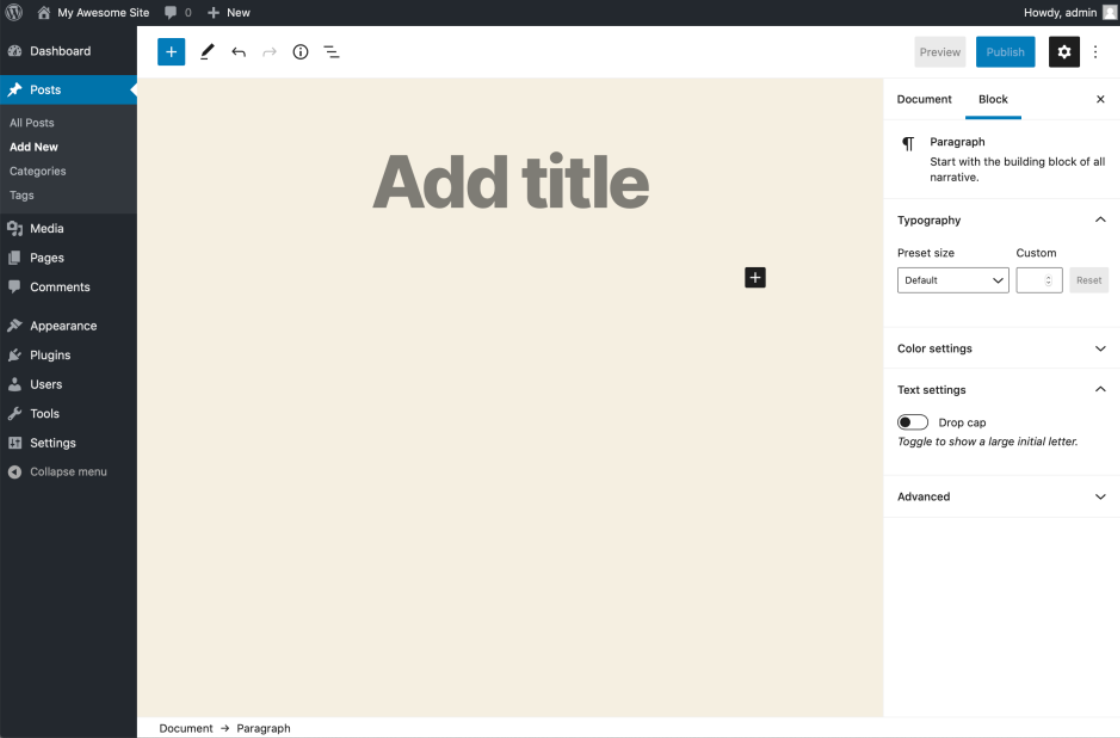
Squarespace’s editor, scoring 8.3, allows easy drag-and-drop website creation without coding. With visually appealing templates and customization options, it caters to beginners and pros alike. The real-time editing experience ensures instant previews. Prioritizing content, it’s mobile-responsive and offers functional features like forms, social media integration, and online stores. Squarespace seamlessly integrates with tools for extended capabilities.
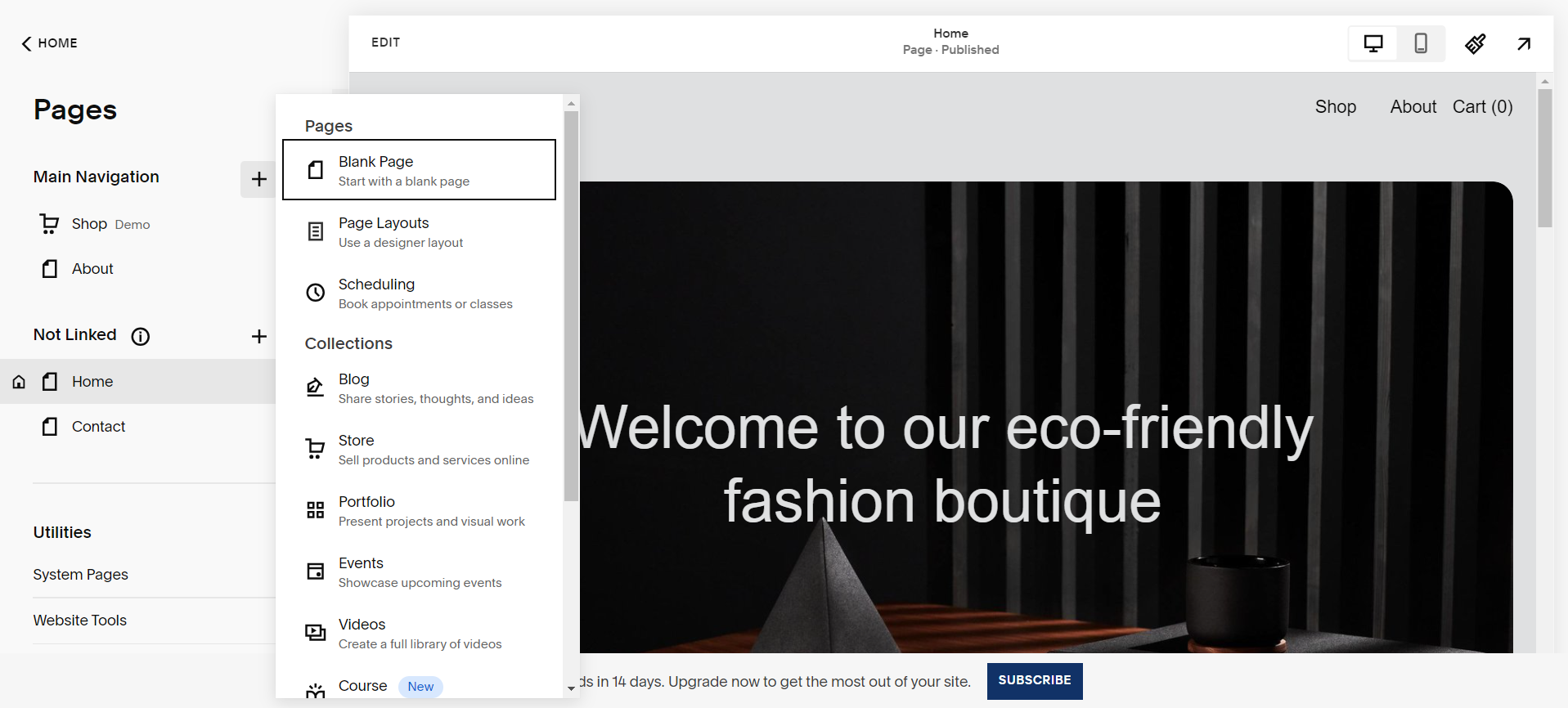
Mobile editor/app
 8.5
8.5
 8.1
8.1

🏆
Winner: Squarespace
. Both Squarespace and WordPress offer mobile apps that allow users to manage their websites on the go. However, these apps have limitations compared to their desktop counterparts.
Squarespace’s app allows for content editing, website analytics, online store management, and social media scheduling. However, it lacks advanced design customization and new page layout creation, which require access to the desktop editor.
On the other hand, WordPress’s app allows for post creation and editing, comment management, content scheduling, and traffic analysis. However, it has fewer advanced options, restricted code access, and limited design customization compared to the web-based editor.
Despite these limitations, Squarespace’s mobile editor score is slightly higher than WordPress’s, making it the winner in this category.
Product testing options
Product Testing OptionsAssesses the options for trying out platform features before commitment.Score Components:
- Trial quality (40%): Extent and usefulness of the trial or free version.
- Feature accessibility (30%): How many features are available to test.
- Trial duration (20%): Length of the trial period.
- Ease of transition (10%): Smoothness of moving from trial to paid plans.
 7.4
7.4
 8.1
8.1
Overall Result
:
WordPress wins
with a score of 8.1 against Squarespace’s 7.4. While Squarespace offers a 14-day free trial and the possibility to test most premium features, WordPress, being an open-source CMS, is free to use and customize, offering extensive flexibility and customization options.

|

|
|
|---|---|---|
|
Free Plan |
No (14-day free trial) |
Yes (Open source software) |
|
Trial Duration |
14 days |
No trial |
|
Testing Premium Features |
Most, except for custom code, premium integrations and removal of Squarespace branding |
No |
Price
Design FunctionalitiesRepresents how well each platform allows for creative design and customization of websites.Score Components:
- Template Variety (30%): Range and quality of design templates.
- Customization (30%): Flexibility and options for design alterations.
- User Interface (20%): Ease and intuitiveness of the design process.
- Responsiveness (10%): Adaptability to different devices and screen sizes.
- Innovation (10%): Unique design features and tools.
 8.4
8.4
 5.9
5.9
Squarespace offers clear pricing plans with different features, while WordPress is free but requires separate purchases for domain, hosting, and website builder subscriptions.
| Price range |

|

|
|---|---|---|
|
Free |
No offering at this amount. |
Free Plan ($0/month): Open source software that is free. Necessary to purchase a domain, web hosting, and website builder subscriptions separately. Offers extensive variety of templates and designs. Lacks built-in ecommerce and AI-assisted builder, but offers solutions through plugins. |
|
$10-$15 |
Personal ($12/month): Build a basic website with limited features for personal use. Access to basic templates, mobile-friendly design, and some social media integrations. Value for price: 5.0 |
No offering at this amount. |
|
$15-$20 |
Business ($16/month): Upgrade features with custom domain, SEO tools, marketing tools like email campaigns, and analytics. Value for price: 6.5 |
No offering at this amount. |
|
$20-$30 |
Commerce ($26/month): Perfect for online stores with built-in eCommerce functionality (unlimited products), secure checkout, inventory management, and marketing tools. Value for price: 8.0 |
No offering at this amount. |
|
$40+ |
Advanced Commerce ($40/month): Cater to high-volume stores with advanced eCommerce features like abandoned cart recovery, product subscriptions, gift cards, and real-time shipping quotes. Value for Price: 9.0 |
No offering at this amount. |
Hosting quality
Design FunctionalitiesRepresents how well each platform allows for creative design and customization of websites.Score Components:
- Template Variety (30%): Range and quality of design templates.
- Customization (30%): Flexibility and options for design alterations.
- User Interface (20%): Ease and intuitiveness of the design process.
- Responsiveness (10%): Adaptability to different devices and screen sizes.
- Innovation (10%): Unique design features and tools.
 7.6
7.6
 0
0
Winner: Squarespace
. Squarespace offers proprietary cloud-based hosting included in all of their plans, with a 99.9% uptime guarantee and data centers scattered across North America, Europe, and Asia. On the other hand, WordPress itself does not directly provide hosting services, and the uptime, uptime guarantee, and data centers depend on the hosting provider chosen by the user. Therefore, Squarespace has a clear advantage in terms of hosting quality.

|

|
|
|---|---|---|
|
Do they offer hosting? |
Yes, included in all paid plans |
No, WordPress itself does not directly provide hosting services. |
|
Data Centers: |
Squarespace’s data centers are strategically scattered across North America, Europe, and Asia |
Data centers depend on hosting providers |
|
Type of hosting: |
Proprietary cloud-based hosting |
WordPress itself isn’t a hosting platform, there are various options when choosing the type of hosting for websites built with WordPress, such as: Shared Hosting, VPS Hosting, Dedicated Server Hosting, Managed WordPress Hosting, Cloud Hosting |
|
Uptime: |
99.9% |
Uptime & uptime guarantee depends on hosting provider. |
|
Uptime Guarantee: |
Yes |
Depends on hosting provider |
Website Speed Optimization
Design FunctionalitiesRepresents how well each platform allows for creative design and customization of websites.Score Components:
- Template Variety (30%): Range and quality of design templates.
- Customization (30%): Flexibility and options for design alterations.
- User Interface (20%): Ease and intuitiveness of the design process.
- Responsiveness (10%): Adaptability to different devices and screen sizes.
- Innovation (10%): Unique design features and tools.
 6.7
6.7
 6.5
6.5
🏆 Winner: Squarespace
Both Squarespace and WordPress place a high priority on website performance and page speed, with Squarespace focusing on responsive design, image optimization, CDN, code minification, and lazy loading of images, and WordPress providing valuable resources for enhancing website’s Core Web Vitals (CWV). However, Squarespace gets a slight edge when it comes to website speed optimization.

|

|
|
|---|---|---|
|
Focus |
Responsive design, image optimization |
Core Web Vitals, WP Rocket, Hummingbird |
|
Performance Tools |
Google Lighthouse, PageSpeed Insights |
Google PageSpeed Insights Integration |
|
Key Strategies |
Responsive design, image optimization, CDN, code minification, lazy loading of images |
WordPress provides valuable resources for enhancing website’s Core Web Vitals (CWV) |
|
Load Times |
0.7s to 9.1 s (Average: 2.9s) |
Varies widely, dependent on optimization |
|
Page Speed Scores Range |
20/100 to 93/100 (Average: 62.7/100) |
Scores vary; influenced by apps, images |
|
Core Web Vitals Improvement |
Emphasis on LCP, FID, CLS improvements |
Analyze CWV, choose a reliable host, optimize images, minimize plugins, use lazy loading, and employ a CDN |
Squarespace has a strong focus on website performance and page speed. It uses responsive design, image optimization, CDN, code minification, and lazy loading of images to enhance the speed of the websites. The load times range from 0.7s to 9.1 s with an average of 2.9s. The PageSpeed scores range from 20/100 to 93/100 with an average of 62.7/100. Squarespace also emphasizes on LCP, FID, CLS improvements for Core Web Vitals.
On the other hand, WordPress provides valuable resources for enhancing website’s Core Web Vitals (CWV). It suggests to analyze CWV, choose a reliable host, optimize images, minimize plugins, use lazy loading, and employ a CDN. However, the load times and PageSpeed scores vary widely and are dependent on optimization.
Get a head start on website creation with AI
Create a custom website tailored to your business needs 10X faster with 10Web AI Website Builder!
Plugins and integrations
Design FunctionalitiesRepresents how well each platform allows for creative design and customization of websites.Score Components:
- Template Variety (30%): Range and quality of design templates.
- Customization (30%): Flexibility and options for design alterations.
- User Interface (20%): Ease and intuitiveness of the design process.
- Responsiveness (10%): Adaptability to different devices and screen sizes.
- Innovation (10%): Unique design features and tools.
 6.8
6.8
 8.8
8.8
🏆 Winner: WordPress.
With a score of 8.8, WordPress outperforms Squarespace, which scores 6.8. WordPress offers over 60,000 free plugins, providing extensive customization options across various domains. Squarespace, on the other hand, lacks an official app store but supports integrations and extensions through custom code injection and third-party tools. While Squarespace offers seamless functionality with over 20 official partner integrations, WordPress’s extensive range of plugins gives it the upper hand.
Squarespace Applications

WordPress Applications
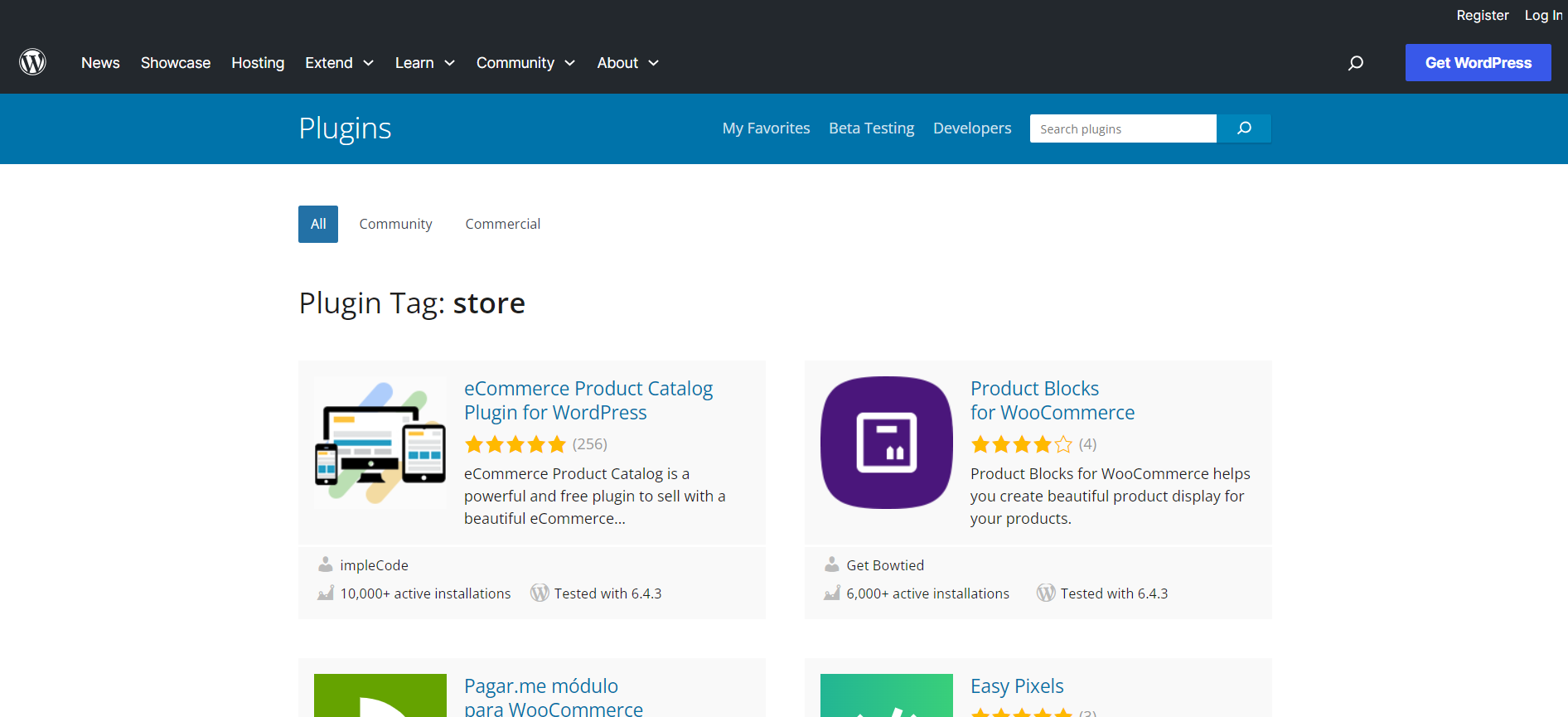
Marketing Features
Design FunctionalitiesRepresents how well each platform allows for creative design and customization of websites.Score Components:
- Template Variety (30%): Range and quality of design templates.
- Customization (30%): Flexibility and options for design alterations.
- User Interface (20%): Ease and intuitiveness of the design process.
- Responsiveness (10%): Adaptability to different devices and screen sizes.
- Innovation (10%): Unique design features and tools.
 8.1
8.1
 8.0
8.0
🏆
Overall Winner: Squarespace
. Squarespace stands out for its built-in features for email marketing and analytics, as well as its simplified SEO optimization. WordPress, while offering similar functionalities, relies heavily on plugins.

|

|
|
|---|---|---|
|
SEO Tools |
|
|
|
Email Marketing |
|
|
|
Blogging |
|
|
|
Social Media Integration |
Direct linking and selling on social platforms, plus feed displays on-site |
Plugins for direct linking, automatic posting, and social feeds display |
|
Analytics and Reporting |
Detailed insights into website performance and visitor behavior |
In-depth analysis via plugins like Google Analytics for WordPress |
|
Ads and Promotions |
Integration with Google Ads and tools for managing sophisticated ad campaigns |
Support for Google Ads and ad management through various plugins |
Customer Support
Design FunctionalitiesRepresents how well each platform allows for creative design and customization of websites.Score Components:
- Template Variety (30%): Range and quality of design templates.
- Customization (30%): Flexibility and options for design alterations.
- User Interface (20%): Ease and intuitiveness of the design process.
- Responsiveness (10%): Adaptability to different devices and screen sizes.
- Innovation (10%): Unique design features and tools.
 7.8
7.8
 5.0
5.0
🏆 Winner: Squarespace
. Squarespace takes the lead in this category with a customer support score of 7.8, compared to WordPress’s score of 5.0. Squarespace provides a variety of customer support options, including live chat, email, a community forum, and a comprehensive help center. Live chat and phone support are available on weekdays, while email support is available 24/7. The community forum and help center offer 24/7 access, and language support is provided in several languages across different support channels.
On the other hand, WordPress, due to its open-source nature, lacks direct customer support. While no official support team is employed, users can find assistance through community forums, the WordPress codex, hosting provider support, and plugin and theme support. However, this support is typically limited to issues related specifically to hosting services.
Security
Design FunctionalitiesRepresents how well each platform allows for creative design and customization of websites.Score Components:
- Template Variety (30%): Range and quality of design templates.
- Customization (30%): Flexibility and options for design alterations.
- User Interface (20%): Ease and intuitiveness of the design process.
- Responsiveness (10%): Adaptability to different devices and screen sizes.
- Innovation (10%): Unique design features and tools.
 8.8
8.8
 6.7
6.7
🏆
Winner: Squarespace
. Squarespace offers a comprehensive suite of security features, including secure hosting, SSL certificates, vulnerability scanning, malware and spam filters, two-factor authentication, data encryption, and compliance with security regulations like PCI-DSS and GDPR. This ensures that your website content and customer information are well-protected.
WordPress, being an open-source platform, offers numerous functionalities and resources to enhance website security. However, the level of security largely depends on the hosting provider and the plugins used by the website owner. While this provides flexibility, it also means that the website owner needs to take more responsibility for their site’s security.
AI Capabilities
Design FunctionalitiesRepresents how well each platform allows for creative design and customization of websites.Score Components:
- Template Variety (30%): Range and quality of design templates.
- Customization (30%): Flexibility and options for design alterations.
- User Interface (20%): Ease and intuitiveness of the design process.
- Responsiveness (10%): Adaptability to different devices and screen sizes.
- Innovation (10%): Unique design features and tools.
 7.5
7.5
 6.1
6.1

|

|
|
|---|---|---|
|
AI-assisted Building |
|
AI Site Builder and Zita plugins offer AI-assisted building |
|
AI eCommerce Features |
AI-powered copywriting, SEO optimization, and email marketing |
AI plugins like Conversios, Ochatbot, and AI Power enhance eCommerce |
|
AI Content Generation |
AI generates diverse content including product descriptions and social media captions |
AI plugins like GetGenie and AI Power assist in content generation |
|
Additional AI Features |
SEO suggestions, inventory management insights, and social media content suggestions |
Wide range of AI plugins and tools for improved website performance |
🏆 Winner: Squarespace
. Squarespace, with a score of 7.5, offers a more integrated AI experience with features for eCommerce, content generation, and additional tools for SEO and inventory management. While WordPress, scoring 6.1, offers AI capabilities through various plugins, it lacks built-in AI features, making Squarespace a more streamlined choice for those seeking AI-assisted website building.

User Management
Design FunctionalitiesRepresents how well each platform allows for creative design and customization of websites.Score Components:
- Template Variety (30%): Range and quality of design templates.
- Customization (30%): Flexibility and options for design alterations.
- User Interface (20%): Ease and intuitiveness of the design process.
- Responsiveness (10%): Adaptability to different devices and screen sizes.
- Innovation (10%): Unique design features and tools.
 7.4
7.4
 8.8
8.8
🏆 Winner: WordPress
. Both Squarespace and WordPress offer different approaches to user management.
- Squarespace’s number of users with editing access varies by plan. The Personal Plan allows one owner, Business and Commerce Plans permit 2 collaborators with different access levels, and the Enterprise Plan offers unlimited users, each with customizable access privileges.
- WordPress’s editing access depends on user roles and additional controls. User roles, ranging from Super Admin to Subscriber, dictate the level of permissions, while plugins and controls such as role management plugins and revision control offer further customization for specific editing rights and collaboration.
Squarespace User Roles and Access Levels:
| Role | Description | Access Highlights |
|---|---|---|
| Owner | The primary user who created the website and has full access. | Full site access, including billing, site settings, content editing, and member management. |
| Administrator | Users granted nearly full access to manage the site alongside the Owner. | Access to most areas except for some owner-specific settings like ownership transfer. |
| Content Editor | Users focused on adding and managing site content without full site access. | Can add, edit, and delete content on pages, blog posts, and manage comments. |
| Billing | Users who manage the subscription and billing details. | Access to billing information and the ability to update subscription details. |
| Store Manager | Users who manage the ecommerce aspects of the site. | Can manage inventory, fulfill orders, manage customers, and view sales analytics. |
| Custom | A role defined by the site owner or administrators with specific access. | Customizable access as defined by the Owner or Administrators, can vary widely between sites. |
WordPress User Roles and Access Levels:
| Role | Description | Access Highlights |
|---|---|---|
| Super Admin | Manages the entire network in WordPress Multisite. | Network admin, manage sites, users, plugins, themes. |
| Administrator | Full access within a single site. | Manage plugins, themes, users, all posts/pages. |
| Editor | Manages and publishes content, including others’ posts. | Edit/publish all posts, manage comments, categories. |
| Author | Publishes and manages their own posts. | Write, edit, publish own posts, upload files. |
| Contributor | Writes and edits their own posts but cannot publish. | Write, edit own posts (no file uploads or publishing). |
Additional Features

|

|
|
|---|---|---|
|
SSL Certificate |
|
|
|
Custom Domain |
|
|
|
Free Custom Domain Included |
|
|
|
International Domains |
|
|
|
Mobile Responsive |
|
|
|
Page Speed |
|
|
|
Website Builder Mobile App |
|
|
|
Convert a Website To An App |
|
|
|
Website Analytics |
|
|
|
Multilingual Sites |
|
|
|
Multiple Users |
|
|
User Feedback
Squarespace is appreciated for its user-friendly interface and versatile tools, making it a great choice for those who aren’t tech-savvy. It offers a range of features like website creation, SEO, online selling, and more, catering to a variety of users. Customers value its good customer support and visually appealing templates, which help in creating a professional online presence. However, some users have reported issues with domain transfer/setup, limited customization options, and consider the pricing slightly higher. There are also occasional concerns about customer service and technical limitations like template rigidity and missing features.
WordPress, on the other hand, is praised for its user-friendliness, cost-effectiveness, extensive themes and plugins, customization options, and supportive community. However, users mention technical challenges, security concerns, a learning curve, and a lack of direct support. Despite these challenges, it remains a widely used and versatile platform, especially beneficial for startups and small businesses.
The making of this blog
We followed a clear, step-by-step process to write and research this article.
FAQ
Which platform is better for beginners, Squarespace or WordPress?
Can I use both Squarespace and WordPress for selling products online?
How do Squarespace and WordPress differ in terms of customization and design flexibility?
What are the major differences in pricing and value between Squarespace and WordPress?












